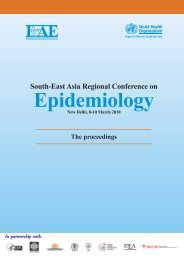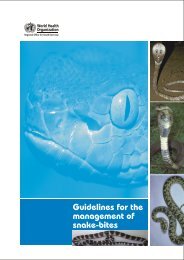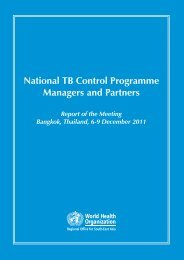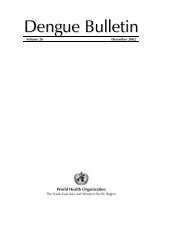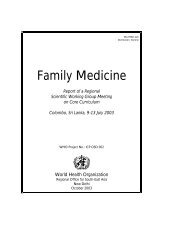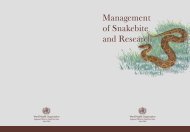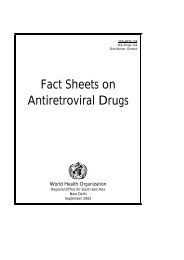Traditional Medicine in Asia
Traditional Medicine in Asia
Traditional Medicine in Asia
You also want an ePaper? Increase the reach of your titles
YUMPU automatically turns print PDFs into web optimized ePapers that Google loves.
<strong>Traditional</strong> <strong>Medic<strong>in</strong>e</strong> <strong>in</strong> <strong>Asia</strong><br />
Bodily Movement and Repose<br />
To ma<strong>in</strong>ta<strong>in</strong> perfect health and a trim body,<br />
exercise and rest are essential. All forms of<br />
activity – whether vigorous, prolonged, mild<br />
or slow – produce heat <strong>in</strong> vary<strong>in</strong>g degrees<br />
but moderately vigorous activity differs from<br />
prolonged mild and slow activity <strong>in</strong> that it<br />
produces more heat and less dispersion.<br />
On the other hand, prolonged activity, even<br />
though mild, produces greater dispersion<br />
rather than heat. Prolonged activity of any<br />
k<strong>in</strong>d leads to dispersion of the <strong>in</strong>nate heat<br />
and thus produces cold and dryness <strong>in</strong> the<br />
system. The presence of some additional<br />
factors may h<strong>in</strong>der or enhance the effect<br />
of the activity. Rest is always cool<strong>in</strong>g and<br />
moisten<strong>in</strong>g. It is cool<strong>in</strong>g because there is<br />
no excitation of heat and there is an <strong>in</strong>ward<br />
collection and aggregation of matter which<br />
suppresses the heat. It is moisten<strong>in</strong>g<br />
because it h<strong>in</strong>ders the proper disposal of<br />
wastes.<br />
Psychic Movement and Repose<br />
Unani physicians ma<strong>in</strong>ta<strong>in</strong> that certa<strong>in</strong><br />
diseases like hysteria and mental disorders<br />
are caused, <strong>in</strong> most cases, by emotional<br />
stra<strong>in</strong> and maladjustment and therefore,<br />
while deal<strong>in</strong>g with such cases, these factors<br />
are taken <strong>in</strong>to account. The curative effect<br />
of music, pleasant company and beautiful<br />
scenery is also recognized by Unani<br />
physicians.<br />
Sleep and Wakefulness<br />
Normal slumber and wakefulness are<br />
essential for health. Sleep resembles rest<br />
while wakefulness is ak<strong>in</strong> to activity. Sleep<br />
directs the <strong>in</strong>nate heat <strong>in</strong>wards and<br />
strengthens the physical faculty. It weakens<br />
the nervous faculty by relax<strong>in</strong>g and<br />
moisten<strong>in</strong>g the passage of impulses and<br />
by mak<strong>in</strong>g the vital force dense by stopp<strong>in</strong>g<br />
dispersion produced by wake-fulness.<br />
Sleep removes all types of fatigue and stops<br />
42<br />
the excessive flow of excretions promoted<br />
by activity. Sleep takes up the digestion and<br />
maturation of food and converts it <strong>in</strong>to<br />
blood. Wakefulness has the opposite effect<br />
of sleep. When it is excessive it disturbs the<br />
bra<strong>in</strong> by produc<strong>in</strong>g dryness and weakness<br />
and thus causes confusion and also dulls<br />
the nervous and mental faculties and<br />
makes the head heavy. Wakefulness<br />
<strong>in</strong>creases the desire for food and stimulates<br />
appetite by dispers<strong>in</strong>g the waste. It,<br />
however, impairs digestion by dissipat<strong>in</strong>g<br />
the strength of faculties. Sleep which is<br />
restless and disturbed is harmful.<br />
Evacuation and Retention<br />
Natural means of excretion are diuresis,<br />
diaphoresis, vomit<strong>in</strong>g, faeces, excretion<br />
through uterus <strong>in</strong> the form of menstruation,<br />
etc. Proper and normal function<strong>in</strong>g of the<br />
excretory process must be ensured <strong>in</strong> order<br />
to ma<strong>in</strong>ta<strong>in</strong> perfect health.<br />
Curative Treatment<br />
Def<strong>in</strong>ition of Disease<br />
Disease is an abnormal state of the human<br />
body which, primarily and <strong>in</strong>dependently<br />
but not secondarily, disturbs normal<br />
functions. Disease may thus be a disorder<br />
of temperament or of structure.<br />
Stages of Diseases<br />
A disease generally has four stages, viz.,<br />
onset, <strong>in</strong>crement, acme and decl<strong>in</strong>e.<br />
Stages of onset and acme are not just the<br />
beg<strong>in</strong>n<strong>in</strong>g and the end of disease, but<br />
def<strong>in</strong>ite periods of onset and acme, dur<strong>in</strong>g<br />
which special rules of management have<br />
to be observed.<br />
Onset<br />
The stage when the disease has just<br />
appeared, rema<strong>in</strong>s stationary and does not<br />
advance to any appreciable extent.



